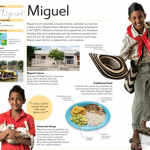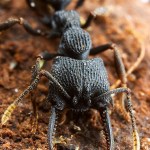diversity
Spring, 2004. I was in the second year of my post-doc, with kids ages 4 and 2. Because I was no longer a student, the full brunt of my student loan payments had hit me, which were collectively almost double the cost of my mortgage. To put it generously, money was tight. Truthfully, we were broke as fuck and struggling each month to stay above water.
I'm from a blue-collar background. My dad was a factory worker for 40 years. My mom had a teaching degree, but "paused" her career to have me (followed by my sister and brother), and was then diagnosed with multiple sclerosis shortly after my…
Children Just Like Me: A Unique Celebration of Children Around the World is a new edition of DK's famous diversity for children book.
From the publisher:
Children Just Like Me is an amazing children's book showing everyday life through the eyes and words of children around the world.
Offering a remarkable insight into the lives of children today all around the globe, Children Just Like Me is packed with photography of children, their friends and family, home, and school vividly illustrating different cultures, from rural farms to busy cities to river boats.
With distinctive DK design and text…
On We Beasties, Kevin Bonham tells us all his thoughts on GoD—the Generation of Diversity that enables B-cells "to make antibodies that recognize almost any chemical structure that has ever existed or will ever exist." By recombining three essential pieces of an antibody (with 100, 30, and 6 variants respectively), using enzymes to slice up DNA and stitch it back together, and owing to a little extra variation from our parents and a dash of random nucleotides, B-cells can fabricate about 10 billion different antibodies to intercept viruses, bacteria, and other intruders. On ERV, Abbie…
A few weeks ago I had dinner and drinks with an old friend who works for the firm which invented the x86 series of microprocessors. He's doing well financially right now, and was very bullish on his firm. More specifically it seems that they're on a hiring binge (he knows because he's been on hiring committees). So a while back he forwarded a resume of a graduate school acquaintance to human resources. His boss came up to him later and told him that there were remunerative benefits to forwarding resumes. If the individual gets hired:
- There is a entry-level $2,000 bonus to the referrer
- But…
On Not Exactly Rocket Science, Ed Yong reports that two new human genomes have been sequenced: that of South African leader Desmond Tutu, and that of !Gubi, a tribal hunter-gatherer. Along with !Gubi, researchers examined the genes of three other Bushmen, and the diversity they observed was "astounding." Ed writes that there is more genetic variation between any two of these individuals than there is between "a European and an Asian," and trying "to understand human genetics without understanding Africa is like trying to learn a language by only looking at words starting with z." On Gene…
On Laelaps, Brian Switek considers the fate of Smilodon, a saber-toothed hypercarnivore that roamed through ancient Los Angeles. Although textbook descriptions of such animals are usually cut-and-dried, Brian writes that "genetic, anatomical, or behavioral variations are grist for natural selection's mill," and so individuals within a species can vary considerably over space and time. On Tetrapod Zoology, Darren Naish discusses the peculiar babirusa, a beast that looks like a pig, incorporates "deer-like slender legs and a multi-chambered stomach," and has horn-like canine teeth growing…
tags: TEDTalks, Diet Pepsi, Aspartame, artificial sweeteners, diversity, choice, happiness, psychology, Malcolm Gladwell, streaming video
Tipping Point [Amazon: $8.54] author Malcolm Gladwell gets inside the food industry's pursuit of the perfect spaghetti sauce -- and makes a larger argument about the nature of choice and happiness [18:16]
TEDTalks is a daily video podcast of the best talks and performances from the TED Conference, where the world's leading thinkers and doers are invited to give the talk of their lives in 18 minutes.
Reader science newbie poses a great question to me and asks for the collective wisdom of our readers:
Dear Sciencewoman,
I have been reading & loving you blog for some time now. Thanks! You rock!
Ok, I have a question....
I have interviewed for, and been given a verbal offer for my first assistant professor position. We are negotiating startup funds, salary, etc right now. Due to state budgetary constraints, I have been informed that all of my startup funds (excluding salary) will have to originate from the department's funds, not university or state money. I have found some information…
Social insects like ants, bees and wasps are some of the most successful animals on the planet. By acting as large super-organisms, they can achieve things that larger singular creatures cannot.
Their astounding selflessness is driven by an unusual way of handing down their genes, which means that females actually have more genes in common with their sisters than they do with their own daughters. And that makes them more likely to put the good of their colony sisters over their own reproductive legacy.
The more related the workers are to each other, the more willing they will be to co-…
It's a diverse melting-pot of different groups, with hundreds of different cultures living together in harmony, many sticking to their own preferred areas. No, not London, New York or any other cosmopolitan city; I'm talking about your skin. It may all look the same to you, but to the bacteria living on it, it's an entire realm of diverse habitats.
From a microscopic perspective, the hairy, moist surface of your armpits is worlds apart from the smooth, dry skin of your forearms. Even though they are separated by mere inches, these patches of skin are as different to their microscopic…
A few days ago I noticed the search term "Malagasy Mystery Ant" showing up in the stats for my other blog. This puzzled me, as it wasn't a phrase I was familiar with. So I googled it.
All mentions of the term trace back to a caption in the New York Times slide show from last week. Goodness. I- your humble blogger- had coined it myself, in a haze of deadline fever while submitting images for the slide show. And then, apparently, I forgot all about it.
Mystrium oberthueri
Am I going senile already? I hope not.
The problem with insects is their sheer number. There are millions of…
It's here! The second edition of the Diversity in Science Carnival! But it wouldn't be here today without the help of Dr. Free-ride and Dr. Isis. With all the time I have had to devote to my mother and her issues the past two weeks, there is no way I could have gotten the carnival up today without their help. Indeed they really get full credit. I haven't even managed to finish a special post I wanted to do for the carnival - so check back later. I'll update when I have it done and add it in here.
But enough of my travails! Let's get on to the really good stuff submitted to this…
Model Minority? No, Thanks!:
In reality, Indian Americans, much like other immigrants, have diverse experiences and backgrounds. Indian Americans are doctors, engineers and lawyers, as well as small business owners, domestic workers, taxi drivers and convenience store employees. Community members hold a range of immigration statuses and include naturalized citizens and H-1B visaholders, guestworkers and students, undocumented workers and green card holders. Some have access to higher education while others struggle to learn English in a new country. As with all communities, Indian Americans…
Dumb article, Nobody's Model Minority, in response to Jason Richwine's Indian Americans: The New Model Minority (H/T Steve), makes a pretty obvious error:
He presses on anyway, attributing Indian Americans' overall "success" in the U.S. to three factors: culture, education (that is, an "obsessive emphasis on academic achievement") and most significantly, IQ. This success is defined by the number of Indian Americans with college degrees (69 percent), their median head of household annual salary ($83,000), and their representation in high-paying fields like medicine and information technology.…
The following post has been slightly revised in response to commentary below and elsewhere. I thank all those who commented for the helpful critique.
The question of diversity in science, and more specifically, success for women, is often discussed in relation to bench or lab oriented fields. If you read the blogs that cover this sort of topic, they are very often written by bench scientists, for bench scientists, and about bench scientists. Which makes sense because most scientists probably are bench scientists.
But a lot of scientists are fieldworkers, and the problems, challenges and…
Guest post from Female Seaside Scientist, for the Diversity in Science Carnival!
Dr. Cindy Lee Van Dover is a Professor of Marine Biology, Director of the Duke University Marine Lab, and Chair of the Marine Science and Conservation Division at the Nicholas School. Her research combines biogeochemistry, biodiversity, ecology of chemosynthetic deep-sea vent organisms, marine technology, and astrobiology.
Faculty page here; research page here; cv here.
More after the jump
Professor Van Dover had an early fascination with Jules Verne's Captain Nemo character from the "20,000 Leagues under…
Karen Ventii is a medical writer in Atlanta, who formerly blogged at Science to Life on the Scienceblogs.com network. Karen has written a guest post for Quiche Moraine on Gender Trends in Science and Medical Writing. Please have a look, it is quite interesting. Here.
Come one come all! February is Black History Month, and to celebrate the diversity in science professions, DNLee from the blog Urban Science Adventures! has arranged a blog carnival titled 'Diversity in Science.' Many ScienceBloggers and other major contributors in the science blogosphere are enthusiastically supporting this blog carnival and have authored a plethora of posts. "There are a wealth of interesting blog posts, covering a broad swath of both semi-historical figures and current inspirational ass kickers," said ScienceBlogger DrugMonkey, who contributed four posts to the festivities…
Well, February has come and gone, Black History Month is over for another year, and we've had the first round of the Diversity in Science carnival. I am sure some of you who blog may have thought about contributing to this carnival but didn't for a variety of reasons. Maybe, like me, you had family issues and/or health issues going on; I almost didn't make it to contribute to the carnival myself. Maybe your job was making you crazy. Or maybe you thought to yourself, "I am not an expert on diversity. I don't want to offend anyone. I don't really know how to go about writing on this topic…
My student, Marta, exploded the other day.
She was sitting there in class two weeks ago and exploded. She does not know that I know this, but I noticed it happen. Since she was sitting, as usual, in the front row, and it was all in her face, the other students did not see it but I definitely did.
By "exploding" in this case I mean that her brain suddenly filled with unanswered questions, which she then started sending me in frantic emails. Many of these questions are about things we will eventually get to in class, but some are on issues that we won't touch on at all. I decided, and I…



